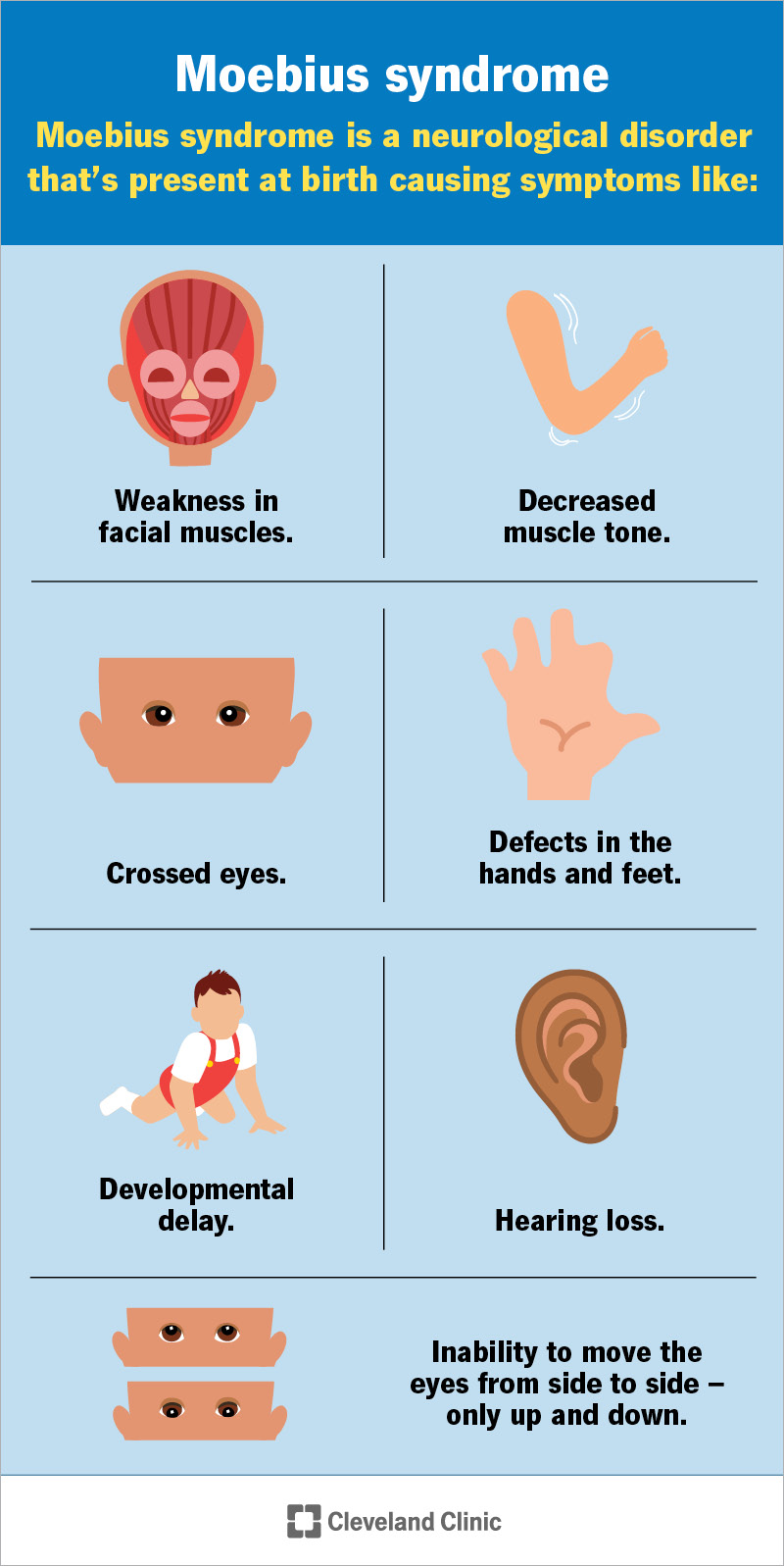Moebius syndrome is a congenital (present at birth) disease. It affects babies’ facial muscles, including their ability to smile or move their eyes, but may cause other symptoms. Treatment includes surgery, physical therapy and mental health support. With treatment and support, most people with Moebius syndrome don’t have shortened lifespans.
Advertisement
Cleveland Clinic is a non-profit academic medical center. Advertising on our site helps support our mission. We do not endorse non-Cleveland Clinic products or services. Policy
Moebius syndrome is a neurological disorder that’s present at birth (congenital). It happens when certain cranial nerves don’t develop as they should during pregnancy. It causes several medical conditions and issues, but the primary issues are weak or paralyzed facial muscles that affect facial expression and eye movement.
Advertisement
Cleveland Clinic is a non-profit academic medical center. Advertising on our site helps support our mission. We do not endorse non-Cleveland Clinic products or services. Policy
The condition is very rare. An estimated 2 to 20 in 1 million babies are born with this condition. Healthcare providers can’t cure Moebius syndrome. They can, however, do surgery to restore facial expression and repair eye issues and other physical differences that the syndrome causes. Most people with the syndrome have a typical lifespan.

Image content: This image is available to view online.
View image online (https://my.clevelandclinic.org/-/scassets/images/org/health/articles/6064-moebius-syndrome)
Moebius syndrome causes many symptoms, but the most common and significant symptom is weakness in the facial muscles that control facial expression, eye movement, sucking and swallowing.
Babies born with this condition have issues feeding because they can’t nurse or take a bottle. They can’t smile, frown or raise their eyebrows. They can’t close their eyelids, even when they’re sleeping.
Other symptoms and conditions include:
Some children with Moebius syndrome have autism spectrum disorder. As children grow older, they may have issues like crooked or missing teeth.
People with Moebius syndrome may deal with social rejection because their appearance is different and because the condition may make it difficult for them to interact with others.
Advertisement
Our faces show our feelings. Facial expressions are one of the ways we communicate. Healthcare providers may refer to this process as facial and automatic mimicry. In facial mimicry, we unconsciously mirror or mimic the expressions we see on other people’s faces. (Ever automatically smile when someone smiles at you? That’s facial mimicry.)
Mirroring people’s facial expressions is how we demonstrate empathy and interact with them. Because people with Moebius syndrome can’t mirror facial expressions and cues, it can be hard for them to recognize and understand other people’s emotions. They may appear indifferent as if they don’t care about other people’s emotions.
Because the condition may affect speech and physical appearance, people with Moebius syndrome may be mistakenly perceived as having an intellectual disability. As a result, studies show, people with this condition may give up trying to connect with others. Loneliness and isolation — even when it’s by choice — may lead to depression and other mental health issues.
Moebius syndrome happens when cranial nerves don’t develop as they should during fetal development. Cranial nerves send signals between your brain and different parts of your head, neck and torso.
The condition affects the sixth cranial nerve, which controls eye movement, and the seventh cranial nerve, which controls facial expression. It may affect the development of other cranial nerves, including the eighth nerve or auditory or vestibular nerve, which manages hearing, and the ninth nerve or glossopharyngeal nerve, which manages the ability to taste and swallow.
Experts don’t know the exact cause, but some potential causes are:
Healthcare providers diagnose the condition by observing specific symptoms:
Providers may do tests to rule out other conditions that could cause Moebius syndrome symptoms.
Treatment varies depending on your child’s situation. Common treatments include surgery, physical therapy and mental health support.
Advertisement
Surgeries to treat Moebius syndrome symptoms include:
Babies and children with this condition may receive:
Advertisement
If your child has this condition, you can expect that:
No, it doesn’t. Most people with Moebius syndrome who receive treatment have normal lifespans.
There’s no way to prevent Moebius syndrome. Scientists are still working to understand what causes it and possible risk factors.
Moebius syndrome may affect your child in several ways. Understanding how the condition may affect your child may help you plan for the support they’ll need now and in the future. And while you’re planning, take time to think about what will help you. Caring for a child with this condition can be exhausting, frustrating and lonely. Take care of yourself by:
Advertisement
Moebius syndrome is rare. You may not even know the condition existed until now. Here are some questions you may want to ask your child’s healthcare provider:
If your baby has Moebius syndrome, you may spend the first few hours, days and weeks after their diagnosis working to comprehend all the ways that the condition will change your child’s life and yours. You may feel angry, anxious and overwhelmed. Your child’s healthcare team will understand your reaction. They’ll take time to answer your questions about what they can do to help your child, and what you can do to care for your child.

Sign up for our Health Essentials emails for expert guidance on nutrition, fitness, sleep, skin care and more.
Learn more about the Health Library and our editorial process.
Cleveland Clinic’s health articles are based on evidence-backed information and review by medical professionals to ensure accuracy, reliability and up-to-date clinical standards.
Cleveland Clinic’s health articles are based on evidence-backed information and review by medical professionals to ensure accuracy, reliability and up-to-date clinical standards.
Moebius syndrome can have a big impact on your child’s quality of life. Treatment with Cleveland Clinic Children’s experts can help your child succeed.
